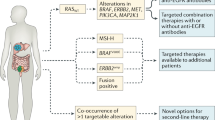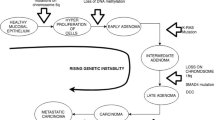Abstract
Colorectal cancer (CRC) remains a major public health problem despite the advent of several conventional chemotherapies and targeted therapies. The identification of prognostic factors, and also factors that can predict response to different treatments and their toxicity, has become amajor issue in order to optimize and personalize treatment of CRC patients. Although few molecular factors are validated in the field of CRC prognosis where the TNM classification is the main parameter used in clinical practice, the fact is not true for molecular predictive factors. Several of them are now validated for predicting response to certain treatments (KRAS mutations and anti-EGFR antibodies) and their toxicity (dihydropyrimidine déshydrogenase [DPD] for 5-fluorouracil [5-FU], UDP-glucuronosyltransferase 1A1 [UGT 1A1] polymorphism for irinotecan) and open up the way of personalized treatment of CRC.
Résumé
Le cancer colorectal (CCR) reste un problème majeur de santé publique malgré l’avènement de plusieurs chimiothérapies et thérapies ciblées. L’identification de facteurs pronostiques, mais aussi de facteurs prédictifs de la réponse à ces différents traitements et de leur toxicité est devenue un enjeu majeur afin d’optimiser et de personnaliser le traitement du CCR. Si peu de facteurs moléculaires sont validés dans le domaine du pronostic des CCR où la classification TNM reste le principal paramètre utilisé en pratique clinique, il n’en est pas de même des facteurs moléculaires prédictifs. Plusieurs d’entre eux sont désormais validés pour la prédiction de la réponse à certains traitements (mutations de KRAS et anticorps anti-EGFR) ou à leur toxicité (dihydropyrimidine déshydrogénase [DPD] et 5-fluorouracile [5-FU], polymorphismes de l’UDP-glucuronosyltransférase 1A1 [UGT 1A1] et irinotécan) et ouvrent la voie d’un traitement personnalisé du CCR.
Similar content being viewed by others
Références
Amado RG, Wolf M, Peeters M, et al. (2008) Wild-type KRAS is required for panitumumab efficacy in patients with metastatic colorectal cancer. J Clin Oncol 26: 1626–1634
Andre T, Boni C, Mounedji-Boudiaf L, et al. (2004) Oxaliplatin, fluorouracil, and leucovorin as adjuvant treatment for colon cancer. N Engl J Med 350: 2343–2351
Barnetson RA, Tenesa A, Farrington SM, et al. (2006) Identification and survival of carriers of mutations in DNA mismatch-repair genes in colon cancer. N Engl J Med 354: 2751–2763
Bokemeyer C, Bondarenko I, Makhson A, et al. (2009) Fluorouracil, leucovorin, and oxaliplatin with and without cetuximab in the first-line treatment of metastatic colorectal cancer. J Clin Oncol 27:663–671
Boland CR, Goel A Microsatellite instability in colorectal cancer. Gastroenterology 138:2073–2087 e3
Cunningham D, Humblet Y, Siena S, et al. (2004) Cetuximab monotherapy and cetuximab plus irinotecan in irinotecanrefractory metastatic colorectal cancer. N Engl J Med 351: 337–345
Di Fiore F, Michel P (2009) [Prognostic role of KRAS mutation in colorectal cancer]. Bull Cancer 96: S23–S30
Diep CB, Thorstensen L, Meling GI, et al. (2003) Genetic tumor markers with prognostic impact in Dukes’ stages B and C colorectal cancer patients. J Clin Oncol 21: 820–829
Duffy MJ, van Dalen A, Haglund C, et al. (2007) Tumour markers in colorectal cancer: European Group on Tumour Markers (EGTM) guidelines for clinical use. Eur J Cancer 43: 1348–1360
Etienne MC, Chazal M, Laurent-Puig P, et al. (2002) Prognostic value of tumoral thymidylate synthase and p53 in metastatic colorectal cancer patients receiving fluorouracil-based chemotherapy: phenotypic and genotypic analyses. J Clin Oncol 20: 2832–2843
Gunderson LL, Jessup JM, Sargent DJ, et al. (2010) Revised TN categorization for colon cancer based on national survival outcomes data. J Clin Oncol 28: 264–271
Gunderson LL, Jessup JM, Sargent DJ, et al. (2010) Revised tumor and node categorization for rectal cancer based on surveillance, epidemiology, and end results and rectal pooled analysis outcomes. J Clin Oncol 28: 256–263
Iacopetta B, Grieu F, Joseph D, et al. (2001) A polymorphism in the enhancer region of the thymidylate synthase promoter influences the survival of colorectal cancer patients treated with 5-fluorouracil. Br J Cancer 85: 827–830
Jen J, Kim H, Piantadosi S, et al. (1994) Allelic loss of chromosome 18q and prognosis in colorectal cancer. N Engl J Med 331: 213–221
Jonker D, Karapetis C, Moore M, et al. (2007) Randomized phase III trial of cetuximab monotherapy plus best supportive care (BSC) versus BSC alone in patients with pretreated metastatic epidermal growth factor receptor (EGFR)-positive colorectal carcinoma: a trial of the National Cancer Institute of Canada Clinical Trials Group (NCIC CTG) and the Australasian Gastro-Intestinal Trials Group (AGITG). American Association for Cancer Research Annual meeting late breaking abstract 1
Karapetis CS, Khambata-Ford S, Jonker DJ, et al. (2008) KRAS mutations and benefit from cetuximab in advanced colorectal cancer. N Engl J Med 359: 1757–1765
Kim GP, Colangelo LH, Wieand HS, et al. (2007) Prognostic and predictive roles of high-degree microsatellite instability in colon cancer: a National Cancer Institute-National Surgical Adjuvant Breast and Bowel Project Collaborative Study. J Clin Oncol 25: 767–772
Lanza G, Gafa R, Santini A, et al. (1998) Prognostic significance of DNA ploidy in patients with stage II and stage III colon carcinoma: a prospective flow cytometric study. Cancer 82: 49–59
Lanza G, Matteuzzi M, Gafa R, et al. (1998) Chromosome 18q allelic loss and prognosis in stage II and III colon cancer. Int J Cancer 79: 390–395
Laurent-Puig P, Lievre A, Ducreux M, et al. (2008) [The biological point of view on pharmacogenetics of anticancer agents in colorectal cancer]. Bull Cancer 95: 935–942
Le Morvan V, Smith D, Laurand A, et al. (2007) Determination of ERCC2 Lys751Gln and GSTP1 Ile105Val gene polymorphisms in colorectal cancer patients: relationships with treatment outcome. Pharmacogenomics 8: 1693–1703
Lecomte T, Landi B, Beaune P, et al. (2006) Glutathion S-transferases P1 polymorphism (Ile105Val) predicts cumulative neuropathy in patients receiving oxaliplatin-based chemotherapy. Clin Cancer Res 12: 3050–3056
Lievre A, Bachet JB, Boige V, et al. (2008) KRAS mutations as an independent prognostic factor in patients with advanced colorectal cancer treated with cetuximab. J Clin Oncol 26: 374–379
Lievre A, Blons H, Laurent-Puig P Oncogenic mutations as predictive factors in colorectal cancer. Oncogene 29: 3033–30343
Locker GY, Hamilton S, Harris J, et al. (2006) ASCO 2006 update of recommendations for the use of tumor markers in gastrointestinal cancer. J Clin Oncol 24: 5313–5327
McLeod HL, Sargent DJ, Marsh S, et al. (2010) Pharmacogenetic predictors of adverse events and response to chemotherapy in metastatic colorectal cancer: results from North American Gastrointestinal Intergroup Trial N9741. J Clin Oncol 28: 3227–3233
Morel A, Boisdron-Celle M, Fey L, et al. (2006) Clinical relevance of different dihydropyrimidine dehydrogenase gene single nucleotide polymorphisms on 5-fluorouracil tolerance. Mol Cancer Ther 5: 2895–2904
O’Dwyer PJ, Catalano RB (2006) Uridine diphosphate glucuronosyltransferase (UGT) 1A1 and irinotecan: practical pharmacogenomics arrives in cancer therapy. J Clin Oncol 24: 4534–4538
Ogino S, Nosho K, Irahara N, et al. (2009) Prognostic significance and molecular associations of 18q loss of heterozygosity: a cohort study of microsatellite stable colorectal cancers. J Clin Oncol 27: 4591–4598
Ogunbiyi OA, Goodfellow PJ, Herfarth K, et al. (1998) Confirmation that chromosome 18q allelic loss in colon cancer is a prognostic indicator. J Clin Oncol 16: 427–433
Parc Y, Gueroult S, Mourra N, et al. (2004) Prognostic significance of microsatellite instability determined by immunohistochemical staining of MSH2 and MLH1 in sporadic T3N0M0 colon cancer. Gut 53: 371–375
Popat S, Houlston RS (2005) A systematic review and meta-analysis of the relationship between chromosome 18q genotype, DCC status and colorectal cancer prognosis. Eur J Cancer 41: 2060–2070
Popat S, Hubner R, Houlston RS (2005) Systematic review of microsatellite instability and colorectal cancer prognosis. J Clin Oncol 23: 609–618
Pullarkat ST, Stoehlmacher J, Ghaderi V, et al. (2001) Thymidylate synthase gene polymorphism determines response and toxicity of 5-FU chemotherapy. Pharmacogenomics J 1:65–70
Sanoff HK, McLeod HL (2008) Predictive factors for response and toxicity in chemotherapy: pharmacogenomics. Semin Colon Rectal Surg 19: 226–230
Sargent DJ, Marsoni S, Monges G, et al. (2010) Defective mismatch repair as a predictive marker for lack of efficacy of fluorouracil-based adjuvant therapy in colon cancer. J Clin Oncol 28: 3219–3226
Shirota Y, Stoehlmacher J, Brabender J, et al. (2001) ERCC1 and thymidylate synthase mRNA levels predict survival for colorectal cancer patients receiving combination oxaliplatin and fluorouracil chemotherapy. J Clin Oncol 19: 4298–4304
Sobrero AF, Maurel J, Fehrenbacher L, et al. (2008) EPIC: phase III trial of cetuximab plus irinotecan after fluoropyrimidine and oxaliplatin failure in patients with metastatic colorectal cancer. J Clin Oncol 26: 2311–2319
Stoehlmacher J, Park DJ, Zhang W, et al. (2002) Association between glutathione S-transferase P1, T1, and M1 genetic polymorphism and survival of patients with metastatic colorectal cancer. J Natl Cancer Inst 94: 936–942
Van Cutsem E, Kohne CH, Hitre E, et al. (2009) Cetuximab and chemotherapy as initial treatment for metastatic colorectal cancer. N Engl J Med 360: 1408–1417
Van Cutsem E, Peeters M, Siena S, et al. (2007) Open-label phase III trial of panitumumab plus best supportive care compared with best supportive care alone in patients with chemotherapy-refractory metastatic colorectal cancer. J Clin Oncol 25: 1658–1664
Viguier J, Boige V, Miquel C, et al. (2005) ERCC1 codon 118 polymorphism is a predictive factor for the tumor response to oxaliplatin/5-fluorouracil combination chemotherapy in patients with advanced colorectal cancer. Clin Cancer Res 11: 6212–6217
Walther A, Houlston R, Tomlinson I (2008) Association between chromosomal instability and prognosis in colorectal cancer: a meta-analysis. Gut 57: 941–950
Yen JL, McLeod HL (2007) Should DPD analysis be required prior to prescribing fluoropyrimidines? Eur J Cancer 43:1011–1016
Zhou W, Goodman SN, Galizia G, et al. (2002) Counting alleles to predict recurrence of early-stage colorectal cancers. Lancet 359: 219–225
Zlobec I, Lugli A (2008) Prognostic and predictive factors in colorectal cancer. J Clin Pathol 61: 561–569
Author information
Authors and Affiliations
Corresponding author
About this article
Cite this article
Lièvre, A. Vers un traitement personnalisé du cancer colorectal: facteurs pronostiques et prédictifs. Oncologie 12, 584–592 (2010). https://doi.org/10.1007/s10269-010-1952-1
Received:
Accepted:
Published:
Issue Date:
DOI: https://doi.org/10.1007/s10269-010-1952-1




